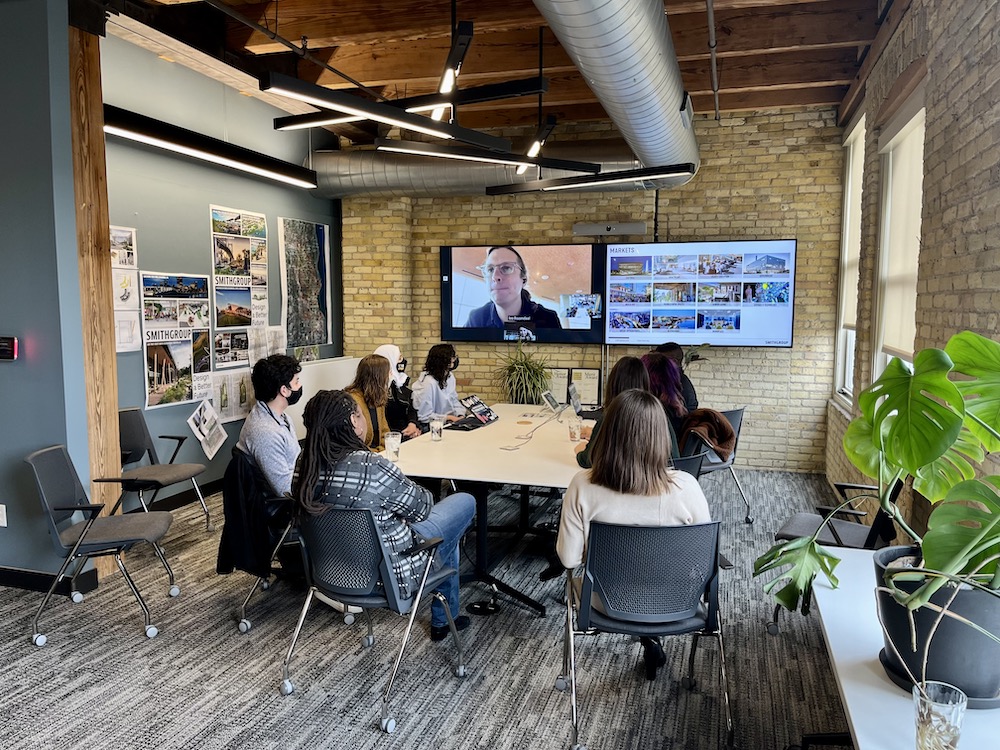SmithGroup’s Deborah Nemeth and Megan Skaalen explore the personal and professional goals that drive Gen Z and how this will impact the future of work.
As Generation Z—those born between 1997 and 2012—begins to enter the workforce, companies are realizing their current office spaces, operational policies, and company norms do not resonate as strongly with this emerging employee base as they did with those of decades past. With the first wave of Generation Z entering the workforce during the COVID-19 pandemic, they never experienced pre-pandemic workplace life. In response, organizational leaders are working to better understand the unique needs and desires of this soon-to-be very large and influential demographic group. As part of an internal research initiative centered on this topic, SmithGroup’s Workplace Practice convened panels of Gen Z employees in Detroit, Michigan and Chicago, Illinois to learn more about the personal and professional goals that drive this generation.

Before we dive into takeaways from the panel discussions, let’s cover a few notable facts: According to the U.S. Census Bureau and an article published by Bloomberg, Gen Z comprises 20.3% of the U.S. population, putting it neck-and-neck with Millennials at 22%. Worldwide, Gen Z has surpassed Millennials as the largest generation, accounting for 32% of the global population. The values, mindsets and behaviors that define this generation have been substantially shaped by several key factors including the group’s deep connection to technology and social media, the globalization of the world economy and the COVID-19 pandemic. Gen Z has also come of age while the world faces some of the greatest environmental, social and economic crises in history. And this generation has no hesitation in confronting an issue, raising their voice and calling for change.
So, what does this mean for the future of work? Let’s dive into the five key aspirations and drivers we’ve uncovered from this generation:
- Amenities, Benefits & Salary: A Shifting Mindset
- Personal & Professional Values are One in the Same
- Virtual, In-Person & Hybrid Work: Balance is Key
- Technology & Flexibility Reign
- Training & Development: One Size Does Not Fit All
Amenities, Benefits & Salary: A Shifting Mindset
Let’s start with the bottom line. Our team of panelists confirmed that Gen Z is motivated by far more than money. While salary remains an important factor, a study conducted by Deloitte reveals that Gen Z values salary less than every other generation. Given a choice of accepting a better-paying yet dull job versus work that was more interesting but didn’t pay as well, Gen Z was evenly split over the choice.
Beyond pay, benefits such as paid time off, mental health days and activities that create a sense of community are essential for Gen Zers. When looking to attract and retain talent, organizations must consider what they can offer to encourage a healthy lifestyle, promote personal wellbeing, and maintain a strong work-life balance. Unique offerings are seen as a huge plus to this group, they bring more than just what they can accomplish in an eight-hour workday. As an example, SmithGroup provides employees an additional 15 Fridays off each year, on top of an employee’s standard PTO offerings. Our HR managers confirm this unique differentiator greatly impacts candidates’ decisions. Other popular differentiators mentioned in the panels include paid gym memberships, commuter benefits, access to pet insurance, and personalized care packages, to name a few.
Personal & Professional Values are One in the Same
Personal and professional values are intertwined and inseparable in the Gen Z world. Gen Zers put work-life balance and personal wellbeing above all other factors that influence their decision-making processes, in work and across all walks of life. Unlike past generations, income and brand reputation are far less important to this group.
According to the World Economic Forum (WEF), most of Gen Zers are not opposed to a corporate job—they’re just not as likely as other generations to make compromises for an organization that doesn’t fit their values. Given the importance that this generation places on autonomy and work-life balance, about half of those surveyed by WEF report that they would quit their job if it interfered with their work-life balance. Additionally, a recent study sampling 35,000 workers across 34 markets found that almost two in four Gen Z individuals would prefer to be unemployed over being stuck in a job they don’t like.
We’re not just workers with our heads down,” said one panelist. “We’re social beings, we need socialization and want to have balance in our lives.
Moreover, let us not forget the importance that this generation places upon community, ethics, and equality. Companies looking to attract and retain Gen Z staff need to highlight their efforts as good global citizens—demonstrating their approach to a broad set of societal challenges such as sustainability and climate change as well as efforts focused on justice, equity, diversity, and inclusion. According to a 2022 Lever report, 42% of Gen Zers would rather be at a company that gives them a sense of purpose than one that pays more. They’re also more likely than the average American to want to work for a company that takes a stance in addressing important global, societal, and environmental issues.

Virtual, In-Person & Hybrid Work: Balance is Key
While SmithGroup’s Gen Z panelists all lauded the benefits of and desire to work virtually in some capacity, all agreed that going completely virtual is not the best approach. Rather, the group expressed a preference for a hybrid approach to work. This was in line with recent research by Asana, which indicates that 68% of Gen Z wants hybrid work.
The group agreed that working in-person allows people to create meaningful relationships and emphasized the value that comes from working face-to-face, like being able to experience and process emotional reactions or facial expressions. There was also a consensus among panelists that in-person work is more beneficial to growth and development as it allows for better communication and an overall richer work experience. Most panelists said they prefer being in the office two or three days a week and that being in an office setting makes them feel more connected to the work. Some prefer a set schedule, while others prefer to be more flexible depending on the day’s work and activities. They want their in-office days to capitalize on interacting with as many teammates and peers as possible. This sentiment echoes points shared by Rebecca Hinds in a recent article authored for Inc.—“Gen Zs don’t want unbridled hybrid work—they want structured hybrid work.”
I definitely feel like I grow more when I’m in the office. I recognize that if I want my career trajectory to continue to go up, if I want to continue to grow personally and professionally, then I need to exert the effort to come into the office more frequently. That’s a personal decision that I need to make for myself.
Technology & Flexibility Reign
Gen Zers are entering the workforce with an incredible knowledge of technology and are comfortable with high-level programs that are crucial at any workplace. It wasn’t a surprise to learn that many Gen Zers evaluate whether or not they want to work for an organization based upon the firm’s technological capabilities.
Gen Zers are looking for flexible, open-minded, future-focused firms that are fluid with technology and are willing to continue to adapt new platforms and tools to continue to propel the organization and its employees forward.

While technologically savvy, panelists shared they often prefer to seek input or ask questions in person or via a phone call as opposed to chatting or emailing. Having an actual conversation seems far superior to the back-and-forth nature of IM-ing or emailing. That said, panelists also shared that they find it uncomfortable initiating dialogue with others. One reason for this hesitance that surfaced several times was a general feeling that they are behind the curve professionally due to pandemic disruptions. As such, they fear that engaging more seasoned team leaders with questions will cast a negative light on their capabilities in colleagues’ eyes.
Regarding flexibility, this desire doesn’t end at remote vs. in-office work. Once Gen Zers enter the office, flexibility in the space design is not only desired but expected. Unlike the generations before them, Gen Z has experienced learning and development in far more intriguing and flexible spaces. The primary, secondary and college/university environments this generation experienced offered spaces for a variety of needs—not just teacher-centered instruction like past generations experienced. As such, they want more out of their workplace than a standard cubicle. Offering employees multiple typologies in activity-based work settings, hackable spaces which can easily be reconfigured, seamless technology connection, while also creating places for respite and human connection is paramount.

Training & Development: One Size Does Not Fit All
When it comes to virtual learning, panelists reported that virtual training programs which include layered approaches and techniques—such as a prescribed list of on-demand learning segments, followed by teammate-led remote tutorials with back-and-forth screen sharing capabilities enabled—can be quite successful for both onboarding and training.
Interestingly, some Gen Z teammates felt that, when it comes to working with new or advanced software platforms, the virtual learning scenario described above was often preferred to in-person learning. The streamlined approach offers a greater opportunity to experience tools and capabilities and quicker understanding of the program. With that, Gen Zers still recognize that working in the office can help further grow their skillsets.
You think you know certain things about a particular software platform, until you get in the office and people teach you tips and tricks that make the work easier and help you be more productive. Sitting next to someone sharing that knowledge goes a long way to strengthening your technical skills. This knowledge sharing isn’t transferred as easily while working remotely.

What We’ve Learned: From A to Z
As one panelist simply put it:
It’s easy to stay home. Employees need a reason to come into the office once or twice a week.
A few years ago, accepting a job that required being present in the office five days a week was the norm. Today, many Gen Zers, especially the younger side of the generation, know that they can productively work from home. Pair that with rising expenses, increasing gas prices, time lost to commuting, etc. and the majority of job candidates won’t even consider taking a job that doesn’t offer hybrid capabilities.
As companies strategize the best way to attract and retain Gen Z, remember that authentic, globally conscious organizations that embrace flexibility, work-life balance, wellbeing, connecting as people, and seamless integration of advanced technologies will have the greatest appeal. If companies overlook these core drivers and unique generational desires, attracting and retaining Gen Z employees will be an uphill battle. The competition is fierce, and this generation won’t hesitate in seeking greener pastures.



You think you know certain things about a particular software platform, until you get in the office and people teach you tips and tricks that make the work easier and help you be more productive. Sitting next to someone sharing that knowledge goes a long way to strengthening your technical skills. This knowledge sharing isn’t transferred as easily while working remotely.